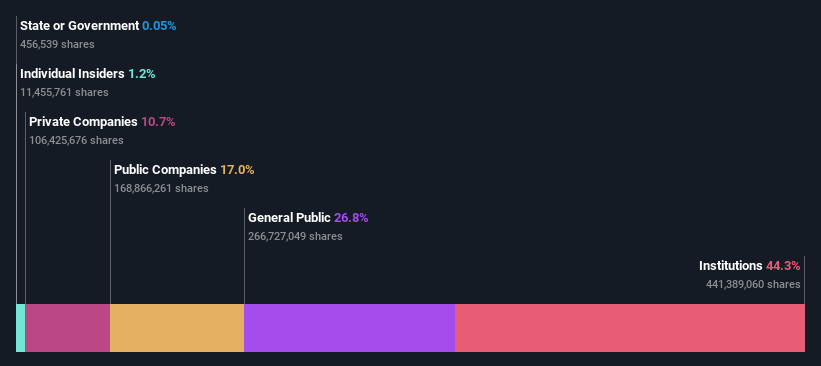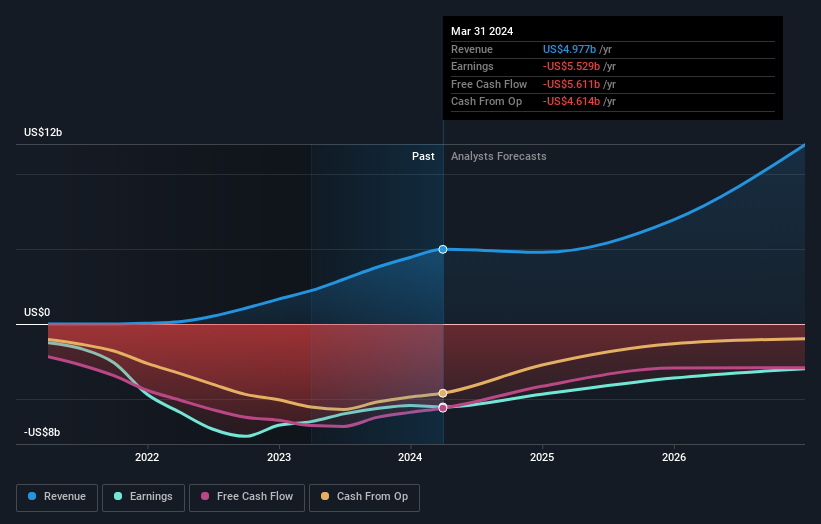Exploring Rivian Automotive, Inc.'s (NASDAQ:RIVN) Ownership Structure
Key Insights
Given the large stake in the stock by institutions, Rivian Automotive's stock price might be vulnerable to their trading decisions
A total of 8 investors have a majority stake in the company with 51% ownership
To get a sense of who is truly in control of Rivian Automotive, Inc. ( NASDAQ:RIVN ), it is important to understand the ownership structure of the business. And the group that holds the biggest piece of the pie are institutions with 44% ownership. Put another way, the group faces the maximum upside potential (or downside risk).
Often called “market movers", institutions wield significant power in influencing the price dynamics of any stock. As a result, if the decline continues, institutional investors may be pressured to sell Rivian Automotive which might hurt individual investors.
Let's delve deeper into each type of owner of Rivian Automotive, beginning with the chart below.
See our latest analysis for Rivian Automotive
What Does The Institutional Ownership Tell Us About Rivian Automotive?
Institutions typically measure themselves against a benchmark when reporting to their own investors, so they often become more enthusiastic about a stock once it's included in a major index. We would expect most companies to have some institutions on the register, especially if they are growing.
Rivian Automotive already has institutions on the share registry. Indeed, they own a respectable stake in the company. This suggests some credibility amongst professional investors. But we can't rely on that fact alone since institutions make bad investments sometimes, just like everyone does. If multiple institutions change their view on a stock at the same time, you could see the share price drop fast. It's therefore worth looking at Rivian Automotive's earnings history below. Of course, the future is what really matters.
We note that hedge funds don't have a meaningful investment in Rivian Automotive. The company's largest shareholder is Amazon.com, Inc., with ownership of 16%. Abdul Latif Jameel IPR Company Limited is the second largest shareholder owning 11% of common stock, and The Vanguard Group, Inc. holds about 7.0% of the company stock. In addition, we found that Robert Scaringe, the CEO has 1.1% of the shares allocated to their name.
We did some more digging and found that 8 of the top shareholders account for roughly 51% of the register, implying that along with larger shareholders, there are a few smaller shareholders, thereby balancing out each others interests somewhat.
While it makes sense to study institutional ownership data for a company, it also makes sense to study analyst sentiments to know which way the wind is blowing. There are plenty of analysts covering the stock, so it might be worth seeing what they are forecasting, too.
Insider Ownership Of Rivian Automotive
The definition of an insider can differ slightly between different countries, but members of the board of directors always count. Company management run the business, but the CEO will answer to the board, even if he or she is a member of it.
Insider ownership is positive when it signals leadership are thinking like the true owners of the company. However, high insider ownership can also give immense power to a small group within the company. This can be negative in some circumstances.
We can see that insiders own shares in Rivian Automotive, Inc.. It is a very large company, and board members collectively own US$118m worth of shares (at current prices). It is good to see this level of investment. You can check here to see if those insiders have been buying recently.
General Public Ownership
With a 27% ownership, the general public, mostly comprising of individual investors, have some degree of sway over Rivian Automotive. While this size of ownership may not be enough to sway a policy decision in their favour, they can still make a collective impact on company policies.
Private Company Ownership
We can see that Private Companies own 11%, of the shares on issue. It might be worth looking deeper into this. If related parties, such as insiders, have an interest in one of these private companies, that should be disclosed in the annual report. Private companies may also have a strategic interest in the company.
Public Company Ownership
We can see that public companies hold 17% of the Rivian Automotive shares on issue. It's hard to say for sure but this suggests they have entwined business interests. This might be a strategic stake, so it's worth watching this space for changes in ownership.
Next Steps:
I find it very interesting to look at who exactly owns a company. But to truly gain insight, we need to consider other information, too. For instance, we've identified 4 warning signs for Rivian Automotive that you should be aware of.
Ultimately the future is most important . You can access this free report on analyst forecasts for the company .
NB: Figures in this article are calculated using data from the last twelve months, which refer to the 12-month period ending on the last date of the month the financial statement is dated. This may not be consistent with full year annual report figures.
Have feedback on this article? Concerned about the content? Get in touch with us directly. Alternatively, email editorial-team (at) simplywallst.com.
This article by Simply Wall St is general in nature. We provide commentary based on historical data and analyst forecasts only using an unbiased methodology and our articles are not intended to be financial advice. It does not constitute a recommendation to buy or sell any stock, and does not take account of your objectives, or your financial situation. We aim to bring you long-term focused analysis driven by fundamental data. Note that our analysis may not factor in the latest price-sensitive company announcements or qualitative material. Simply Wall St has no position in any stocks mentioned.

 Yahoo Finance
Yahoo Finance 

